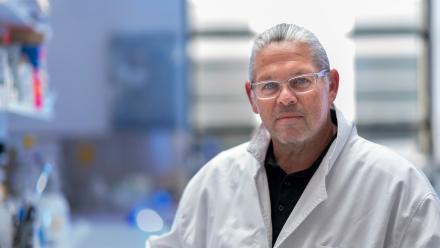When a passion for science means business
A passion for the business side of science has helped John Rivers land his dream job, just weeks after finishing his PhD.
John, who has been studying at the ANU Research School of Biology (RSB) for the past four years, is working as a Genetic Technologies Officer, managing the Statistics for the Australian Grains Industry project at the Grains Research and Development Corporation (GRDC).
He realised fairly early on that he was passionate about how science can be applied to food and agriculture. "Ever since high school I've been interested in how science contributes to society," John said.
During his PhD, John developed these ideas. "I became fascinated in the specifics of how ideas get out - who do I talk to? Who can help me turn this idea into something that can benefit society?"
He joined the ANU team to compete in the 24 hour Australian French Entrepreneurship Challenge, which they won. "We worked for 24 hours. It was tiring, but at about 3am we realised our idea could work. It felt like the best idea ever, we were on fire!" he said.
"It was very empowering to see this process in action. Now I know which doors to knock on, who to ask, and what the reaction is likely to be."
John's PhD research looked at how certain aromatic chemicals are formed in plants, using the model plant Arabidopsis thaliana. He was specifically interested in whether genes or environments were responsible for the production of these volatile chemicals.
"I tested the gene theory. I had four mutant Arabidopsis lines, and I looked at the volatile profiles of the mutants, and made crosses, to find out which genes were responsible for each volatile molecule."
John discovered none of the genes was responsible for the production of aroma. "It's very interesting, the plant genes were not volatile-producing machines. It looks like the plant must produce non-volatile compounds but losing those genes results in a compensatory effect of producing more volatile compounds, which is counter-intuitive, an unusual discovery.
"Those volatile compounds are probably produced as a result of environmental influences such as light or oxygen, in other words, as part of the photosynthesis process."
"I'm really interested in how chemicals contribute to biomolecules, and they become cells, and they become living things", said John. During his PhD he also studied the key components of tomato aroma and flavour, and developed a new technique to measure these.
His job resulted from a chance meeting with Lauren Du Fall, a GRDC delegate visiting RSB. "We had a chat in the lab, and I indicated an interest in being closer to industry applications on the science-industry pipeline," John said.
Once his PhD was handed in, she invited him to come and talk about opportunities. "We had a yarn, and that resulted in a temporary position, which was supposed to end in March, but the need was still there, so they offered me a permanent job," he said.
In his new role at the GRDC, John's team is responsible for statistics support for a wide range of projects. "Datasets are getting very large," he said, "and this is a specialist project to provide statistical support and management.
"This is a very exciting organisation to be in. I'm excited to get my hands dirty!"


